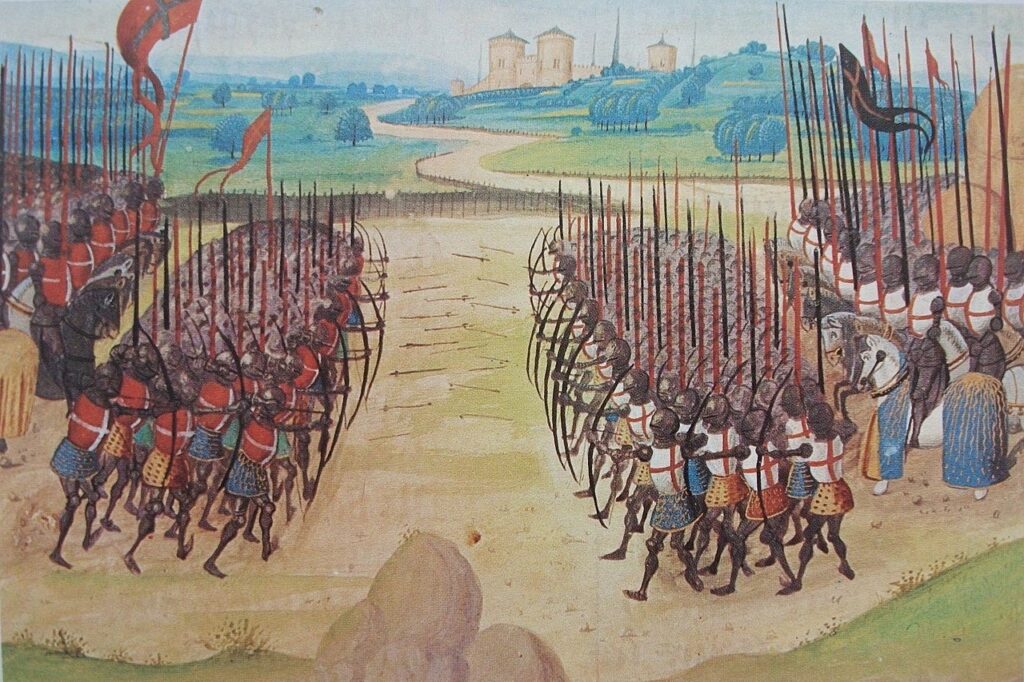Speaking of Henry V, the myth of Agincourt is bullshit. Every armchair dilettante historian will always wax poetic about the glories of the English longbow and the virility of King Henry V but such ridiculousness belies the true nature of war … and the world.
Wars are never simply won by technology. And the world is never changed by the sole “great man.” These are convenient lies-simplifications to avoid the reality of our complex chaotic existence. Simplifications to justify the unjustified, unsupportable (over the long term), and immoral accrual of overwhelming socio-economic power in the hands of a tiny group of privileged males because they “earned” it, “deserve” it, and/or “made empires” through their own indomitable will to power. A laughable conceit, if not so destructive to all of humankind.
But I digress.

Chroniques d’Enguerrand de Monstrelet: en deux livres, avec pièces justificatives
While the longbow may have played a decisive role during one phase of the battle known as Agincourt (and in some ways during the Hundred Years War), the battle itself would be a historical footnote, like the resounding British victories on Long Island and Manhattan during the Revolutionary War, if not for factors completely unrelated to technology or Henry V’s leadership/martial skills. In other words, Henry V and his relatively small band would have inevitably been forced out of France regardless of Agincourt if the French had their shit together. Which they didn’t.
During this time, the French Civil War (1407-1435) divided what we now know as “France,” primarily between Burgundy and Armagnac. Screw the myth of English longbowmen, Henry faced only Armagnac forces, who were also already technically fighting Burgundian forces–and the Burgundian”French” troops happily sat by as the Armagnacs lost to Harry at Agincourt. At other times, the Burgundians actively provided aid to beleaguered English forces.
You see, if France was united, even if the English forces had somehow won Agincourt against both the Armagnacs and Burgundians, they would have inevitably lost the war/campaign.
Indeed, the moment the French Civil War ended (or, more accurately, when this particular phase of intra-French rivalry ended) and French forces united (Burgundy, Armagnac, etc.), there was no way England could keep any part of France over the long term (Ah, but Calais, … what of Calais? Go back to your armchair).
Despite this cold and stark reality, the (typically male) historian will repeat the childish rhetoric of the “strong” King Henry V who gained France and then his “weak” son King Henry VI who lost it (he was weak-minded, mind you, but that’s not the point). Utter bullshit. No English King could have maintained such a powerful foothold in a united France (=at least Burgundy+Armagnac).
Moreover, even at home, King Henry VI’s “weakness” was also beyond his control, as the internecine fighting between the so-called Yorkists (who at times controlled the town of Lancaster and not York) and the so-called Lancastrians (who at time controlled the city of York but not Lancaster) was also inevitable, although made very lively by an array of fascinating and capable characters (alas, poor Warwick the “kingmaker,” the Percys, the Nevilles, the Beauforts, the Baratheons, …). Moreover, in these “Wars of the Roses,” * the French played an important role in almost every decisive win by either side-another fact usually glossed over in the myth-making history of “Great Men.”
It’s impossible to reconcile a coherent and full understanding of real world facts with the predominant historical myths of “great” man determining the destinies of countries/wars through their own merit and brilliance, and/or “weak” leaders losing their countries/wars through their inherent “weaknesses,” “fatal flaws,” and/or “corrupt ways.” Utter bullshit. And incomprehensible as a belief system to anyone who reads and understands the facts of the historical record (vs. those read “biographies” of …. great men).
Yet this myth of the Great Man is alive and well today, and actively rotting away the foundations of our democracy, our economy, and actively sabotaging any rational attempts at planning for the future of humankind. But I guess it is helping to build our new “Republic,” our Grand Republic of privileged (mostly) white, (mostly) male Great Leaders. Huzzah!
______________________________________
* The name “Wars of the Roses” is an anachronism, as the English for hundreds of years called them simply the “civil wars.” The name “Wars of the Roses” didn’t gain use until the 1800’s, after Sir Walter Scott popularized the name in a novel (based on a pretty cool garden scene, Act 2, Sc. 4, in Shakespeare’s H6p2, which itself was written more than a 100 years after those civil wars). But you can easily prove me wrong by finding the phrase being actively used and understood by any populace anywhere before 1829. Please, go ahead.
Not that the white and red roses weren’t significant, but the truth is H7 magnified their significance in choosing his emblem of “reconciliation,” a combo of the red and white roses, as the Yorkist and Lancastrian forces had a number of symbols, emblems, and sigils over the course of those civil wars, and roses never figured highly among them (particularly as identifiers of own’s forces in battle).
H7’s, the Tudor rose of reconciliation, with Yorkist red somewhat more dominant even though H7 was a Lancastrian (a politically astute choice):

The White Rose of Lancaster (not so important as a visual representation of Lancastrian forces, particularly in battle, before the reconciliation):

The Red Rose of York (never so important as a visual representation of Lancastrian forces, particularly in battle, before the reconciliation):

